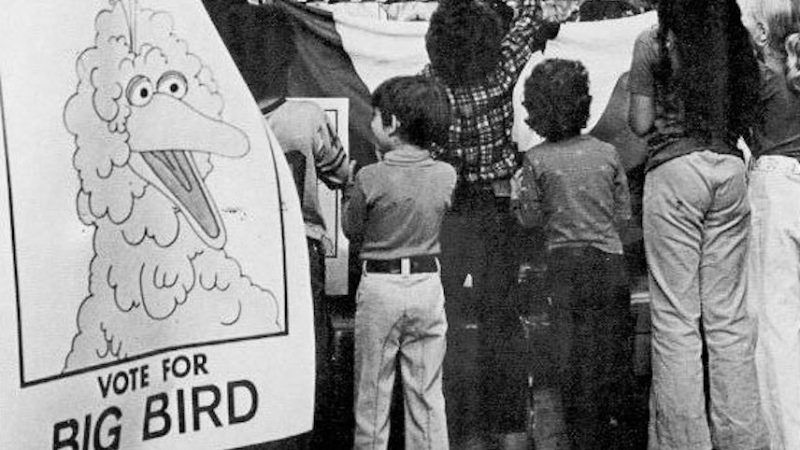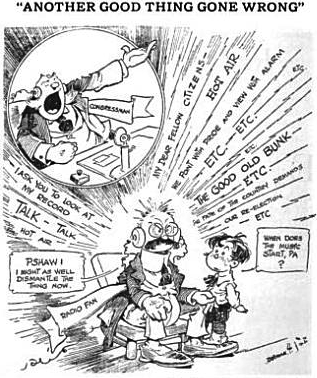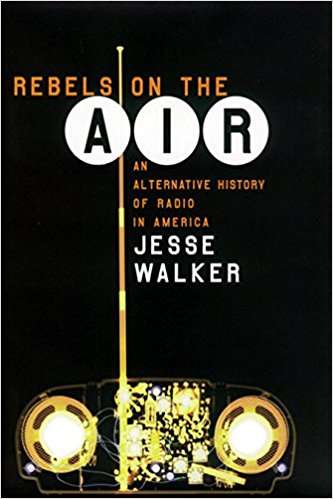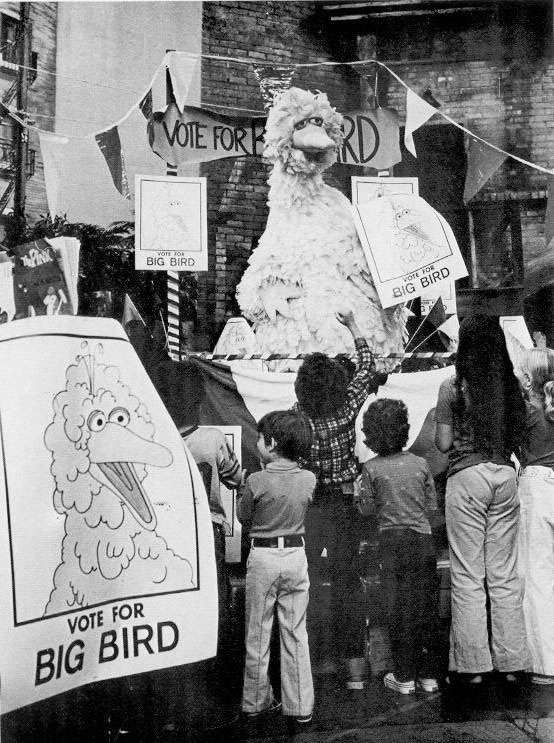The Corporation for Public Broadcasting Turns 50
The controls concealed in the subsidies

Fifty years ago this week, Lyndon Johnson signed the Public Broadcasting Act of 1967, the law that created the Corporation for Public Broadcasting. I've been writing about the CPB for two of its five decades; here's a sampling of those stories:

• "With Friends Like These" (July 24, 1997): A paper I wrote for Cato on the ways the CPB has made independent, listener-funded, volunteer-driven community radio stations blander and less accountable to their communities. This is out of date in all sorts of ways, but the history I discuss is still relevant. And there may be some broader lessons in my explanation of a cycle built into the CPB's subsidies:
The limited amount of money the state has to offer requires it to discriminate on some rational basis—if the CPB dispensed funds to every small community station in America, it would have to divide its budget so finely that no station would receive enough money to justify the corporation's existence. So the CPB strives to direct its money to the stations with the most powerful signals and the largest measured audiences and shies away from financing more than one outlet in a single market. But the CPB requirements encourage stations to grow and adopt "professional" values, putting further pressure on the CPB's budget and forcing it to further restrict the flow of money, refueling the cycle yet again. If the CPB's budget is expanding anyway—as it did during the Carter years, for example—the cycle might be slowed and the problem concealed. If the budget is contracting, as it is today, the problem only gets worse. Under any circumstances, the professionalization and expansion cycle is built into the federal subsidies; it cannot be eliminated by minor reforms or by putting a friendlier group of bureaucrats in charge.
• "It Didn't Begin with Sesame Street" (October 1997): I review Ralph Engelman's book Public Radio and Television in America: A Political History. Among other things, the article discusses the birth of the Corporation for Public Broadcasting; it also looks at the handful of public TV stations that existed before the CPB, when some social engineers at the Ford Foundation argued that "educational television" (as it was then known) could be a force for social uplift, "an instrument for the development of community leaders," even "a form of psychotherapy."
• "Independent Airwaves" (March 2001): I interview a man with a plan to "restructure public broadcasting as an independent public trust." His group was split between people who wanted a completely independent institution and people who just wanted to rearrange how the government gives broadcasters money.

• Rebels on the Air: An Alternative History of Radio in America (2001): The CPB isn't the only topic I cover in this book, but it's a significant part of it.
• "The Way to Sesame Street" (November 2009): For Sesame Street's 40th birthday, I looked at the complicated social legacy of a show that "reflected both an antipathy to commercialism and a fascination with commercials, which served not just as a source for its parodies but as a model for its programming." We had to make some cuts to the piece to fit it into a two-page spread; I posted some of the outtakes, including the tale of the time an executive mistook Jim Henson for a member of the Weather Underground, on my personal blog.
• "Radio Theater" (February 2011): Republicans have repeatedly threatened to defund the CPB. Not only do these standoffs always end with the institution still standing, but in the long run its budget keeps growing. This article takes a tour through the history of those fights, arguing that the real
point of these exercises isn't to cut the broadcasters loose. It's to use the threat of cutting them loose to whip them into shape.
The system was still standing after Nixon made his threats, but all save one of the programs he found objectionable went off the air. After the Gingrich-era battle ended, the Republican pundits Fred Barnes, Peggy Noonan, and Ben Wattenberg all landed gigs at PBS—and following an initial cut, the CPB's budget crept back upward. The funding fight under George W. Bush took place against the backdrop of a conservative CPB chief crusading for a more right-friendly PBS and NPR.

• "If You Love Big Bird, Set Him Free" (April 14, 2011): I did a point/counterpoint with an NPR executive about CPB funding. (He wanted to keep the federal dollars flowing; I liked the idea of a genuinely independent trust.) Our argument was originally published at Bloomberg, but I can't find it on their site anymore. You can still read my half of the debate, though, because we posted it at Reason a couple of weeks later.
• "Public TV Execs Fall In Alabama" (June 19, 2012): This little blog post isn't actually about the CPB. It's about America's oldest public TV network, established in Alabama in the 1950s. But it's such a perfect example of how government money can lead to government control that I have to include it here anyway. The short version: When you're funded by the likes of George Wallace, you tend to pull your punches when covering civil rights.
• "Woody Allen's Lost Nixon Movie" (August 8, 2014): Another example of government money having a chilling effect. In 1971, when Woody Allen made a mockumentary spoofing Henry Kissinger, PBS refused to distribute it.
• "Congress Reaches Spending Deal; 'Skinny Budget' Goes Out the Window" (May 1, 2017): I won't try your patience by linking to every CPB budget fight since that "Radio Theater" article linked above came out. But I'm including this one, just to remind you that it takes more than a blustery president and some budget-cutting fanfic to change a pattern as entrenched as this.
Editor's Note: As of February 29, 2024, commenting privileges on reason.com posts are limited to Reason Plus subscribers. Past commenters are grandfathered in for a temporary period. Subscribe here to preserve your ability to comment. Your Reason Plus subscription also gives you an ad-free version of reason.com, along with full access to the digital edition and archives of Reason magazine. We request that comments be civil and on-topic. We do not moderate or assume any responsibility for comments, which are owned by the readers who post them. Comments do not represent the views of reason.com or Reason Foundation. We reserve the right to delete any comment and ban commenters for any reason at any time. Comments may only be edited within 5 minutes of posting. Report abuses.
Please to post comments


including the tale of the time an executive mistook Jim Henson for a member of the Weather Underground
Look, I'm willing to laugh at executives as much as anyone. But let's be real. He probably was.
State-funded media is never a bad idea.
But who would put liberal elitist talk radio on the air for millions of smug liberals to listen to if it weren't federally subsidized? -- libs
The short version: When you're funded by the likes of George Wallace, you tend to pull your punches when covering civil rights.
We's MASS communicatin'! We ain't one-at-a-timin' it!
He'd appreciate it if you'd eat his farnina, and vote him in a second term.
Speaking of the media, holy cow is Dave Weigel creepy looking.
http://disq.us/p/1nm7iy8
He looks like someone you would catch secretly installing a webcam in the women's shower at the gym.
And he is "looking at white people with a new intensity" these days.
http://www.washingtonexaminer......le/2639756
I am sure he is.
He looks like Ron Jeremy's less successful brother.
Or as another comment put it "Pablo Escobar's dumber brother". The jokes just write themselves.
Is that a fake mustache? It looks like it was drawn in as an afterthought.
Where picture?
This dude used to write for Reason, right? I kept hearing how he was a great follow on Twitter but all I ever saw was insufferable, elitist snark and BernieBro crap.
This forgets NPR's greatest sin; it inflicted Prairie Home Companion on a defenseless nation for something like 40 years. I am not sure the Soviets hated America enough to do that.
Seriously. If i accidentally hear part of "Prairie Home Companion" while driving i'll turn the radio off so hard that one time i sprained three fingers.
People who like Prairie Home Companion are the same people who find Al Franken witty.
OMG! Both are Minnesota things! OMG! I never realized it until now! This explains much. Must ponder.
Something to do with lutefisk, i bet. If you grow up around people who consider oven cleaner to be an appropriate marinade for fish, your whole sense of reality is gonna be pretty skewed.
How to eat lutefisk. Get some of that really good Norwegian mustard. Put it on the lutefisk. Mix it in. Put on more mustard. Stir it around. Enough mustard that you can't see the lutefisk. When no one is looking, dump the lutefisk into the potted plant behind you. Eat the mustard.
Minnesota is a silly place. Though it's nice for the month between first winter and second winter.
In NPR's defense, Wait! Wait! is both more politically balanced, more informative, and, on average, funnier than the standard fare coming out of Comedy Central.
Are you telling my South Park is not a fair and balanced analysis of the world?
He said "standard," not "stuff that came out of the 90s."
"Prairie Home Companion" was APR.
As an eebil person on the right, I never understood the big deal about public television. Granted, the congressionally mandated big three monopoly of broadcast television sucked, but that was the fault of mandating the monopoly. Cable and streaming have shown that variety will emerge when you allow competetion. Even variety in "education" television. The solution wasn't taxpayer funded and nanny managed television, but to get the government OUT of television altogether.
Public television isn't even independent television, despite attempts to portray it as such. It's extemely biased towards government, and as a side effect, pro-government progressivism. Other than a few outliers like Firing Line, conservative voices arguing for limited and restrained government were not allowed. The epitome of this is NPR which in its attempt to be balanced and equal, ends up being a parody of itself. Conservative voices are interviewed in the same way a psychoanalyst approaches a patient. And of course, libertarian voices are simply not heard, because to the left, interviewing a big government conservative means you've covered all of the right.
Its defenders always point to Sesame Street. Yeah because without PBS Jim Henson would have been nothing. I mean a guy who was a big enough genius to create a child entertainment empire that Disney paid several hundred million dollars for the rights to it a few years ago would have never gone anywhere without the government's help.
It should be pointed out that PBS today when it is not running fundraising shows, is mostly just rebroadcasts of BBC shows. I am going to go out on a limb here and say that one of the existing cable channels, perhaps even BBC America, or streaming services could manage to give upper-middle-class America it's Poldark and Victoria if there were not PBS.
I'll be honest with you, that's all I recall from PBS and my childhood (that being Mystery!). The fact that they're basically a repeater station for the BBC is bizarre to me in many respects, but it's only gotten worse now that BBC has it's own American version.
How the fuck does PBS manage to keep showing BBC programming? The BBC isn't exactly known for giving away it's programming to non-brits. How much does PBS pay the BBC to show BBC programming on a non-BBC channel, one might ask.
It was agreed upon at a Freemason meeting.
To be fair, there was a time it was the only domestic source of The Prisoner and Python. Though neither that nor Nova, or anything else needs federal assistance. It's not even that much anymore.
Sure, after "The Prisoner" had aired on CBS 2 summers.
Way back when I watched TV, the local PBS station was one of the first to get black-listed. During one of the fund-raising sessions, the featured Depak Chopra.
That's it; done!
Sorry, is this an "I'm too smart to watch TV" brag or a "I won't tolerate a single deviation from my preconceptions" brag?
I think it's a "Fuck Deepak Chopra" brag.
Can I make an "I had to google to see who that is" brag?
No.
Time for a "I'm not gonna brag about how I'm not gonna brag" brag!
Does anyone watch TV any more? And by 'TV', I mean you turn it on and get whatever's delivered to you at a given schedule?
I do, but only passively. Like, I throw on a channel I like and it's background to me cleaning or cooking or something.
Why the fuck would I pay someone to show me commercials? If anything, I'm going to pay them not to show me commercials.
I took advertising classes in college, and as a result I'm incapable of watching commercials without screaming at the television.
We cut the cord over a year ago, but I occasionally watch broadcast via my digital antenna. Not so much for network but for broadcasts of old TV shows and movies. Watched Sharky's Machine, The Wild, Wild West series, and some of the dot channels for PBS.